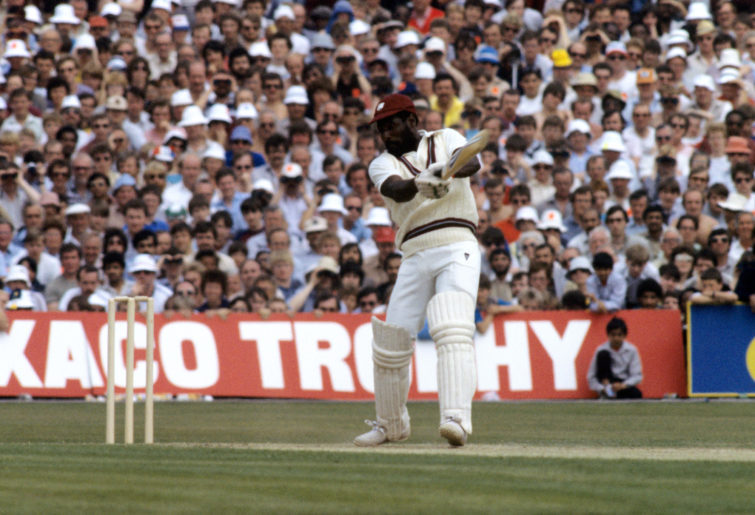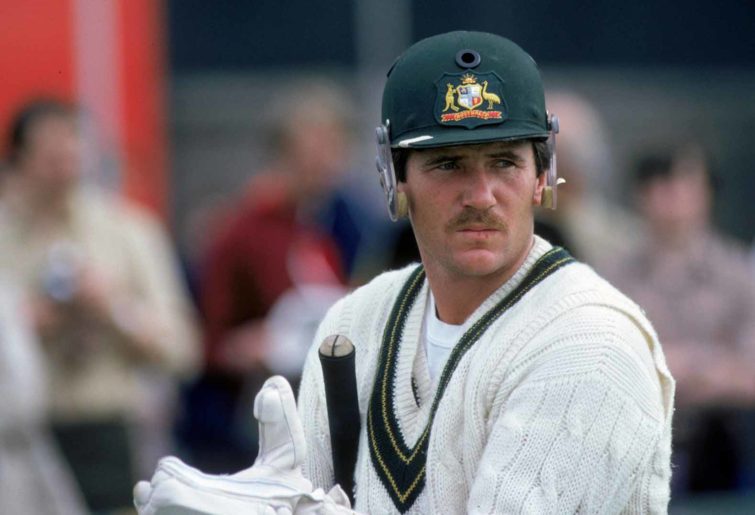A world-famous all-rounder, former captains of West Indies, Australia and England, plus one of the lesser lights of West Indies cricket in the 1980s all feature in this second part of my series.
You can read Part 1 of the series here.
Viv Richards – 61 against India in Kingston, 1983
Slow batting by both teams and frequent weather interventions meant that at the halfway point of the final day this game was heading towards a boring draw. But then the two famous Antiguans, Sir Andy Roberts and Sir Vivian Richards, changed the course of the match.
In a blistering spell of fast bowling reminiscent of his young days Roberts took the last five wickets in the Indian second innings. India slumped from 5-136 to 174 all out.
The West Indies target was 172 in roughly 26 or 27 overs. Not too many people gave them any chance of victory, In the first innings they had taken 116 overs to score 254 runs.
But on the final day they produced a fabulous chase led by their champion batsman. Desmond Hayness gave the initial momentum, but it was the 66-run third-wicket stand between Gordon Greenidge and Richards that really raised the hopes of a Windies win.
Richards dominated the proceedings and his 61 came from just 36 balls, with five fours and four sixes contributing a significant proportion of his runs. He was the fifth man out, but by this time the West Indies were on the brink of a famous victory, and they eventually won by four wickets.
Local boy Jeff Dujon quite appropriately made the winning hit.

Viv Richards (S&G/PA Images via Getty Images)
Sir Richard Hadlee – 99 against England in Christchurch, 1984
Among the four great all-rounders of the late 1970s and the 1980s, Hadlee without much doubt was the era’s best bowler. But his greatness as a bowler often made people forget his ability as a batsman.
His batting average of 27 may not look brilliant, but just like Kapil Dev, he never took his batting too seriously. As a batsman he often tried to play his shots and entertain the crowd. However, whenever his team needed runs from him, he did his best to respond.
The first day of the Christchurch Test against England in February 1984 was one such occasion. There were talks of the pitch favouring the seamers before the start. England even drafted in Anthony Pigott, the Sussex fast bowler playing for Wellington at the time, to bolster their injury hit pace attack.
Despite concerns about the pitch, Geoff Howarth, after winning the toss, decided to bat first. He was soon regretting the decision. After Norman Cowans bowled Howarth for nine the score read 3-53. The loss of the Crowe brothers made it 5-137.
Hadlee entered the scene and completely changed the scenario. He didn’t attempt any dogged fight; he just started to play his shots right from the word go. He benefited from some poor bowling by Ian Botham and the inexperienced Pigott. They bowled too short and too wide to Hadlee, presenting him with some easy runs square of the wicket.
After Jeremy Coney contributed a useful 41 runs, wicketkeeper Ian Smith gave Hadlee company. The only regret of the New Zealand crowd was that Hadlee missed his hundred by just one run. His 99 came from just 81 balls, having been at the wicket for less than two hours. He’d struck 18 fours in his innings.
England scored 82 and 93 (following on) in the match and thus achieved a rare feat. Hadlee took 3-16 and 5-28 in the match.
Allan Border – 98* against the West Indies in Port of Spain, 1984
In the first half of the 1983-84 season Australia completed an impressive 2-0 home series win against Pakistan. At that same time the West Indies were thrashing India at home 3-0. Even on slow wickets Malcolm Marshall (33 wickets) and Micheal Holding (30) proved too quick for the Indian batsmen.
Joel Garner, the big bird, was given a rest from the Indian tour. Fresh and raring to go, he took nine wickets in the drawn first Test of the series in Georgetown. And here, at Queen’s Park Oval, he wasted no time after Lloyd put the opposition in – in fact he took all the first five wickets as Australia slumped to 5-85.
At this stage debutant Dean Jones joined VC Allan Border and together they shared a brave 100-run partnership.
Jones, the young Victorian, scored 48. With his game built on the slow pitch of MCG, he often struggled against genuine pace during his career. Here also he didn’t enjoy the short bowling from the West Indies pace battery, but he showed lots of courage before giving a return catch to Viv Richards.
The lower-order batsmen tried their best to support Border, but Wayne Daniel ran through the tail. And when Garner dismissed Terry Alderman for one for his sixth wicket, Border was left unbeaten on 98. He batted for full six hours for his runs.
It was a deja vu for him in the second innings except that on this occasion Border completed his hundred. Again the top order perished early, leaving Border to fight it with the help of the tailenders. Geoff Lawson and, more importantly, Terry Adlerman performed courageously, and Australia saved the match – or maybe we can say that Allan Border saved the match.

Allan Border (Adrian Murrell/Getty Images)
Mike Gatting – 79 against Pakistan in Faisalabad 1987
The Pakistanis had won the first Test of the series in Lahore. Still, the England batsmen started the second Test quite positively, with Chris Broad showing the way. However, when Abdul Qadir dismissed Bill Athey it became 2-124. Qadir with his tail up was expected to run through the middle order.
Mike Gatting, the England captain, came to the wicket. A decade ago both Qadir and Gatting had made their Test debut in the same series during the Packer era. As for their recent rivalry, it was fairly even. Back in the last Test of the summer at the Oval Gatting had scored a fine hundred to save the Test against Pakistan despite Qadir’s ten-wicket haul. But then, in Lahore, Gatting looked hapless just like the others.
Here Gatting decided attack would be the best policy. With Broad bating sensibly at one end he attacked the Pakistan spinners in a most glorious manner. He thoroughly dominated the third wicket stand of 117. The partnership ended when Qadir bowled the England skipper for a well-made 79. His runs had come from just 81 balls with 14 fours.
Interestingly, starting with his dismissal, England slumped from 2-241 to 292 all out. That shows the significance of his innings.
Sadly, the infamous Shakoor Rana incident later in the match completely overshadowed Gatting’s fine display with the bat.
Gus Logie – 81 at Lord’s against England, 1988
The little Trinidadian was an unsung hero of the West Indies team of the 1980s. Though Lloyd spoke highly about his potentials when he made his Test debut in 1983, the emergence of Richie Richardson had put him in to the reserves. It was in 1987, only after the retirement of Larry Gomes, that he could command a regular place in the team.
He scored a hundred at Calcutta in 1987, but his most famous effort came at Lord’s in the following summer.
After a drawn first Test, Viv Richards won the toss and elected to bat. Within the first hour he was regretting his decision. Graham Dilley got his outswingers going perfectly, and he ran through the top order to leave West Indies at 5-54. At this stage Jeff Dujon joined Logie.
And the 130-run stand gave the initiative back to the Windies. Both were natural stroke-makers, but due to the situation both started in cautious fashion. The partnership was broken when John Emburey bowled Dujon for 53. As for Logie, he looked set for a hundred until Gladstone Small dismissed him for a well-made 81.
The West Indies made only 209, emphasising the value of the 130-run partnership. But Malcolm Marshall, with ten wickets, ensured a 134-run win for the tourists.
Logie scored 95* in the second innings and was adjudged the man of the match.
from The Roar https://www.theroar.com.au/2020/05/03/memorable-innings-that-werent-a-hundred-part-2/


0 Comments